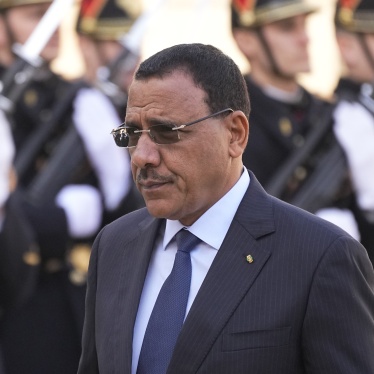(Moscow) - Uzbek authorities should immediately and unconditionally release Alisher Karamatov, an imprisoned human rights defender who was made to endure several hours of freezing conditions to coerce him to confess to a disciplinary violation, Human Rights Watch said today. Human Rights Watch called on the authorities to investigate the incident and hold the perpetrators to account.
On December 30, 2008, prison officials tried to force Karamatov to sign a statement confessing to a disciplinary violation that he says he did not commit, according to his wife, who visited him in January. He refused, and instead told the officials he would complain to the prosecutor's office. In response, the officials ordered Karamatov, 40, to remove his hat and outer clothing and stand outside wearing only his prison uniform, a coverall made of thin fabric. The temperature was below freezing and it was snowing. After enduring the cold for three hours, Karamatov agreed to sign.
"Despite calls by European governments and the US to ensure justice for Karamatov, he finds himself denied not only justice, but even basic humanity," said Igor Vorontsov, Uzbekistan researcher at Human Rights Watch. "Needless to say, Karamatov should never have been imprisoned in the first place."
Human Rights Watch called on the European Union and the new US administration to take a stronger stance on progress on human rights in Uzbekistan and to press the government to free imprisoned rights defenders.
In the December 30 incident, a prison lieutenant accused Karamatov of saying Muslim prayers and having too long a beard, the sign of an observant Muslim. Karamatov's wife said that he does not wear a beard and has not prayed aloud while in prison. Praying, especially in groups, is often prohibited for prisoners in Uzbekistan. The Karimov government for years has been involved in fighting what it considers an Islamist threat, mostly by persecuting such independent Muslims who pray and study religion outside official institutions and guidelines.
Karamatov, an active member of the Human Rights Society of Uzbekistan in Gulistan, in Syrdaryo province, was arrested on April 29, 2006. He was sentenced to nine years of imprisonment on politically motivated charges of extortion after a trial in June 2006 that independent observers documented as unfair. According to his public defender, Karamatov confessed to the charges after being tortured. The defender said that investigators beat Karamatov on the soles of his feet, threw him to the ground, and suffocated him with a gas mask to coerce him to confess.
Karamatov developed severe tuberculosis in prison and was transferred to the prison hospital in October 2008. Human Rights Watch has called on Uzbekistan to free him on health grounds, and Karamatov's lawyer also filed a request for Karamatov's release on health grounds. On January 27, 2009, the authorities denied the request, claiming that his condition had improved.
Human Rights Watch has expressed its serious concern over the health of several imprisoned human rights defenders in Uzbekistan, and has documented cases in which the authorities not only have failed to provide adequate medical care to such prisoners, but have actively undermined their health through torture, ill-treatment and the use of psychotropic drugs.
Human Rights Watch also submitted a report about human rights violations in Uzbekistan on December 3, in connection with the UN Human Rights Council's Universal Periodic Review.
In a hugely disappointing move on October 13, EU foreign ministers decided to lift the visa ban on eight former and current Uzbek government officials thought to have been responsible for the attack by police on mostly unarmed demonstrators in the city of Andijan in May 2005, killing hundreds of them.
The European Union pledged to keep the situation under review and called on Uzbek authorities, among other things, to release all imprisoned human rights defenders and to cease their harassment. The EU cited progress in human rights as a justification for easing the sanctions, but at least 11 human rights defenders remain in prison, as well as dozens of other political prisoners and thousands of "religious prisoners" (whom the Uzbek government portrays as "extremists").
Human Rights Watch called on the EU to urge the Uzbek government to free human rights defenders who are still jailed in Uzbekistan.
"The international community, particularly the EU and the US, should make the release of Karamatov and other human rights defenders a precondition for future engagement with Uzbekistan," said Vorontsov. "This is a chance for the new US administration to take a stronger position on human rights issues in Uzbekistan. A strong international signal will not go unnoticed by the Uzbek leadership."






